


Emma Dunning Banks (stage name, Dorothy Crane; 1856-1931) [1] was an American actress, dramatic reader, teacher, and writer. [2]



Emma Dunning Banks (stage name, Dorothy Crane; 1856-1931) [1] was an American actress, dramatic reader, teacher, and writer. [2]
Banks was a graduate of the National School of Elocution and Oratory in Philadelphia, Pennsylvania. [3] In that city, in 1883, she won a large gold and silver medal at the Academy of Music. She also studied privately for four years under teachers in New York City and Boston. [4]
Her notable performances included the "Curse Scene", from Leah the Forsaken, and the Malediction of Medea. In 1904, in the Bridgeport Opera House, she produced two of W. S. Gilbert's most successful comedies, viz. : Engaged and Pygmalion and Galatea , which were highly praised by the press. [4] Eugenia Williamson Hume was a pupil. [5]
She was also the author of Banks's Recitations with Lesson-Talks. Some of her articles appeared in The Voice while some of her original recitations were reprinted by the British press. [2]
Her husband was Edgar Granville Banks. [6]
While on Saturdays, she used a New York City address, Banks made her home in Bridgeport, Connecticut, [7] where she died April 8, 1931. [1]

Emma Rood Tuttle was an American author and lecturer engaged in educational and reform work. Her literary work was versatile. It primarily included poetry and journalism, but also a considerable amount of lectures, essays, and contributions to journals. As a poet, she was a constant contributor to the leading reformatory journals, and frequently to the secular press. Sometimes, she collaborated with her husband, Hudson Tuttle, on books. Their home was a center of reformatory influence in Northern Ohio.

Adelina Murio-Celli d'Elpeux was a Polish opera singer, music teacher and composer.
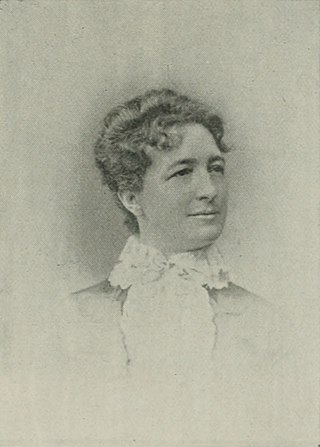
Kate Brownlee Sherwood was an American poet, journalist, translator and story writer of the long nineteenth century, as well as a philanthropist, and patron of the arts and literature. Sherwood was also the founder of the Woman's Relief Corps (WRC) and served as its second president.
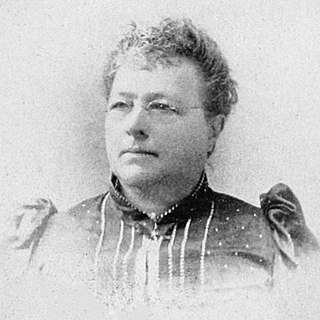
Emma Pike Ewing was an American author and educator on housekeeping and cooking. Ewing hailed from New York. After the American Civil War, she served as dean, Chautauqua Assembly Cooking School; professor domestic economy, Iowa Agricultural College; director Model School of Household Economics; and affiliated with Marietta College, Ohio, Model Home School of Household Economics. Her contemporaries included, Mary Johnson Bailey Lincoln, Marion Harland, Fannie Merritt Farmer, Sarah Tyson Rorer, Maria Parloa, Gesine Lemcke, Ella Morris Kretschmar, and Linda Hull Larned. Ewing was the author of several cookbooks such as Cooking and Castle-building (1880), Soup and Soup Making (1882), Bread and Bread Making (1883), Salad and Salad Making (1884), A Text-book of Cookery, for Use in Schools (1899), Cookery Manuals (1890), and The Art of Cookery: A Manual for Homes and Schools (1896). She died in 1917.
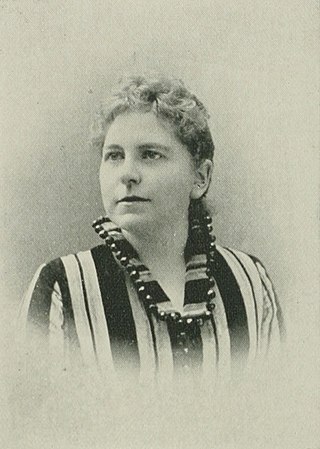
Elizabeth Marney Conner was a 19th-century American dramatic reader and educator, and the founder of the Buffalo School of Elocution. She published recitations in both prose and verse, and was also the author of an operetta.

Lady Mary Alice Seymour was a 19th-century American musician, author, elocutionist, and critic. She was referred to as "Octavia Hensel" in the music world, where she was an internationally known music critic. As a critic, Seymour was renowned. Her musical nature, her superior education, her thorough knowledge of the laws of theory and familiarity with the works of the great composers of the classic, romantic and Wagnerian schools, and the later schools of harmony, gave her a point of vantage above the ordinary. She was one of the original staff writers on the Musical Courier, having been its correspondent from Vienna and other European centers. Seymour played the piano, harp, guitar and organ, but never appeared on the stage, except for charitable events, as her relatives were opposed to her pursuing a professional life. A "confirmed bluestocking", Seymour was also a polyglot who spoke seven languages fluently: German, French, Spanish, Italian, Portuguese, Romanian, and Hungarian dialects. She died in 1897.

Clara Maria Brinkerhoff was an English-born American singer and musical educator. She sang in public while still a child, her voice and culture attracting the attention of the highest and most critical circles. Her father, Mr. Rolph, would not consent to her going on stage as a professional singer, so only the occasional concert employed her voice when she was still young.

Mabelle Biggart was an American educator, dramatic reader, preacher, and writer. In 1890, Biggart was in charge of the department of elocution at the Chautauqua assembly of Glen Park, Colorado, and that she was giving exercises illustrating the Delsarte System. Around the same time, she had been instrumental in starting the Polytechnic Institute and Woman's Athletic Club of Denver, intended to aid women to gain health, strength, and beauty. She had also assumed charge of a "Polytechnic Department" in the Denver NewsLetter, devoting the space to physical culture, science, and literature. She wrote articles for various publications including, "A Woman that is a Woman", "List to the Voice!", "Newfoundland", "Where is the New Woman?", "Dr. Grenfell's Labrador Mission", and "On the Painted Desert".

Emma Whitcomb Babcock was an American litterateur and author. She did considerable work as a book reviewer, and contributed to various leading magazines. She was the author of Household Hints, a domestic management guide, and A Mother's Note Book, as well as other works. She was president of The Belles-Lettres club, well known in western Pennsylvania, which founded a public library. Babcock died in 1926.

Emma Huntington Nason was an American poet, author, and musical composer. When only twelve years old, she began to write in verse. She devoted much time to literature, art and music, in each of which she excelled. Her works included, My Ancestors; Address and poem at the dedication of the Hallowell library, March 9, 1880 with historical sketch ..., 1880; Songs of the orient, 1892; The Tower, with Legends and Lyrics, 1895; Augusta centennial souvenir., 1897; Old colonial houses in Maine built prior to 1776, 1908; and Old Hallowell on the Kennebee, 1909.

Jessie Fremont O'Donnell was a 19th-century American writer of poems, novels and magazine articles, as well as a lecturer. In December, 1887, her first book, Heart Lyrics appeared. Later books were Love Poems of Three Centuries, Three Centuries of English Love-Songs, A Soul from Pudge's Corners, and others, besides contributions to various U.S. periodicals. She also wrote essays, short stories, and character studies.
Emma Alice Browne was a 19th-century American poet. She contributed to various periodicals, including Louisville Journal, The Pantagraph, The Saturday Evening Post, Graham's Magazine, and The Methodist Protestant (Baltimore). Many of her early writings were contributed to the Cecil Whig, while the New York Ledger monopolized her writings for the last 32 years of her life. Browne was a friend of George D. Prentice and Sallie M. Bryan.
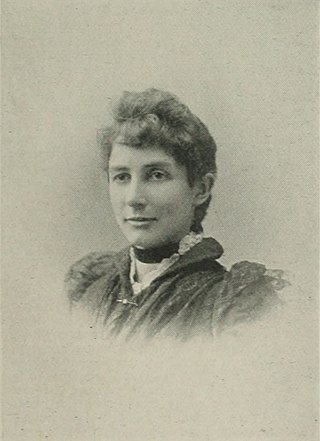
Emma Winner Rogers was an American writer and speaker upon economic and social questions, and on the Arts and Crafts movement. She favored suffrage, and served as an officer of the National American Woman Suffrage Association. Among her published works can be counted Deaconesses in the early church. Deaconesses in the modern church. (1891), The social failure of the city (1898), The Journal of a Country Woman (1912), and Why not complete the enfranchisement of women (1912).

Emma Howard Wight was an American author and newspaper correspondent. After leaving school, she wrote occasionally for amusement. Her friend, Bertha von Hillern, induced Wight to start publishing her work. Articles by Wight appeared in various papers and were extensively copied. Her numerous theological articles attracted wide attention. She also wrote serial novels. Among her works can be counted Passion Flowers and the Cross. A novel (1891), The Soul of Edmund Jaffray, an emotionalism in 1 act (1892), My Husband (1893), A Loveless Marriage (1894), The Little Maid of Israel (1900), The Berkleys (1900), and Like No Other Love (1910).
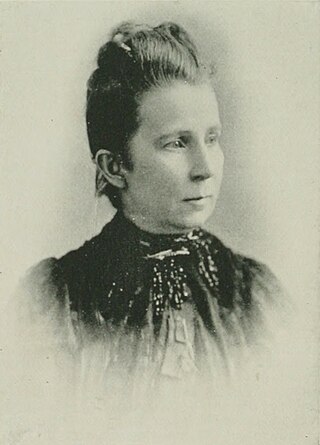
Aline Reese Blondner was an American musician and music educator. Widely known as pianist, organist and teacher, she trained with Asger Hamerik, Carl Reinecke, and Franz Liszt, and performed with the Cincinnati Symphony Orchestra and the New York Philharmonic Orchestra.
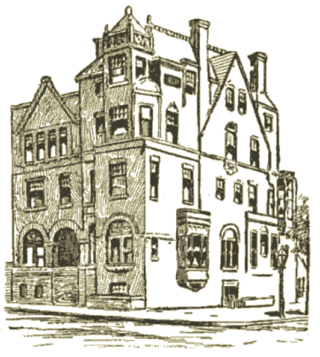
Van Norman Institute for the education of young ladies was an American girls' school in Manhattan, New York City. It was founded in 1857 by the Rev. Dr. Daniel C. Van Norman (1815-1886). After his death, it was conducted by his widow, Amelie Veiller Van Norman. until 1906.
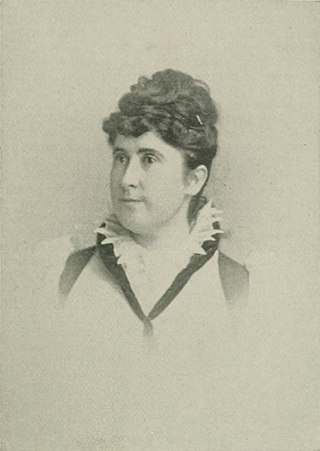
Mrs. Findley Braden was the pen name of Anna Braden an American writer, newspaper editor, and elocutionist. Prior to marriage, she used Madge Rile and other pen names.
National School of Elocution and Oratory was an American school for speech arts, focused on rhetoric and elocution. It was established by Jacob and Rachel H. Shoemaker in Philadelphia, 1873. Attention was given to conversation and oratory, vocal culture, reading, and recitation. It awarded Bachelor's and master's degrees. From 1915, their daughter, Dora Adele Shoemaker, served as principal, renaming the school "Shoemaker School of Speech and Drama" and adding coursework in journalism and radio technique. The school closed in the late 1930s.

Rev. Emma Pow Bauder was an American evangelist, missionary, reformer, and author. Affiliated with the Church of the United Brethren in Christ in Michigan since 1879, she soon thereafter relocated to the San Francisco Bay Area, where she was also active with the Woman's Christian Temperance Union (W.C.T.U.), the largest women's organization in the U.S. during the Gilded Age.

Eugenia Williamson Hume (1865–1899) was a 19th-century American elocutionist, and educator. She was one of the best educated and most accomplished women in St. Louis, Missouri in her day.